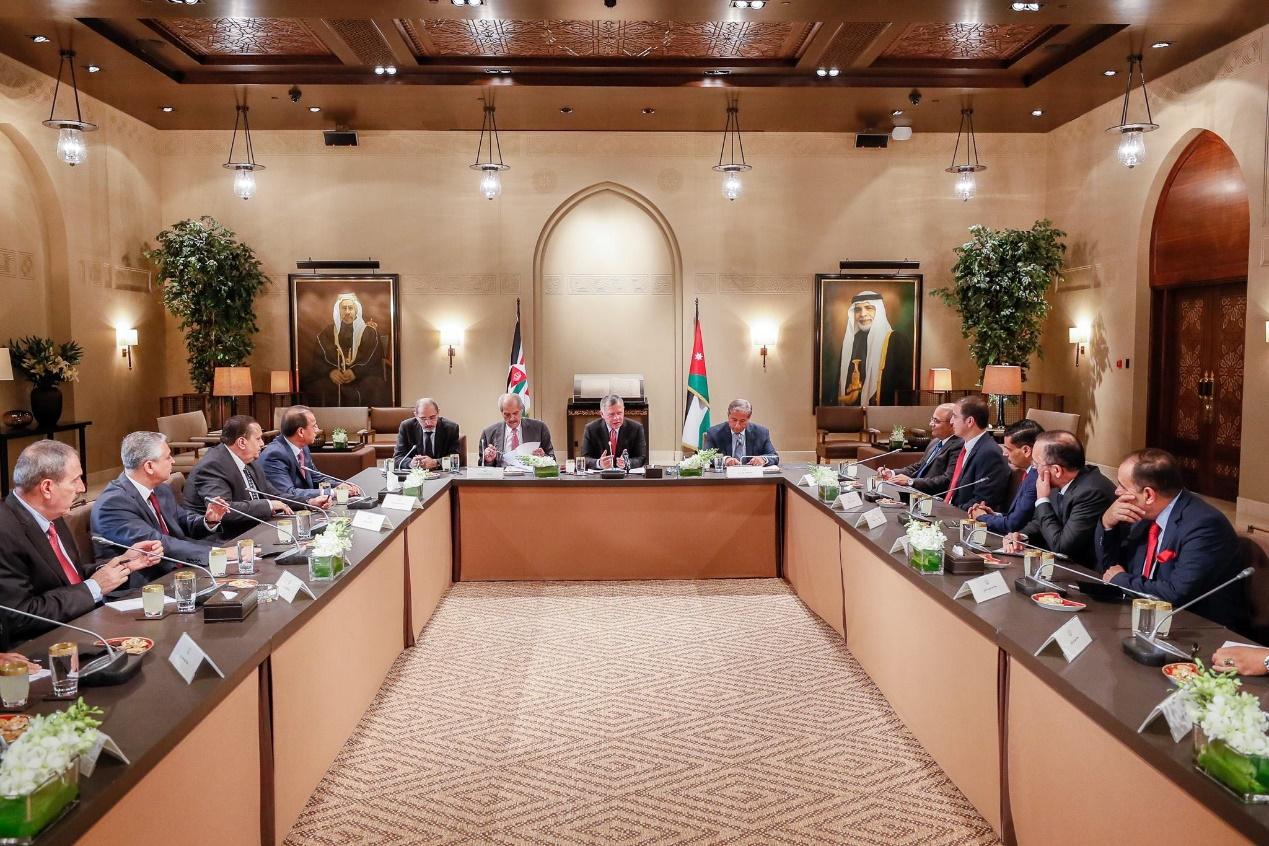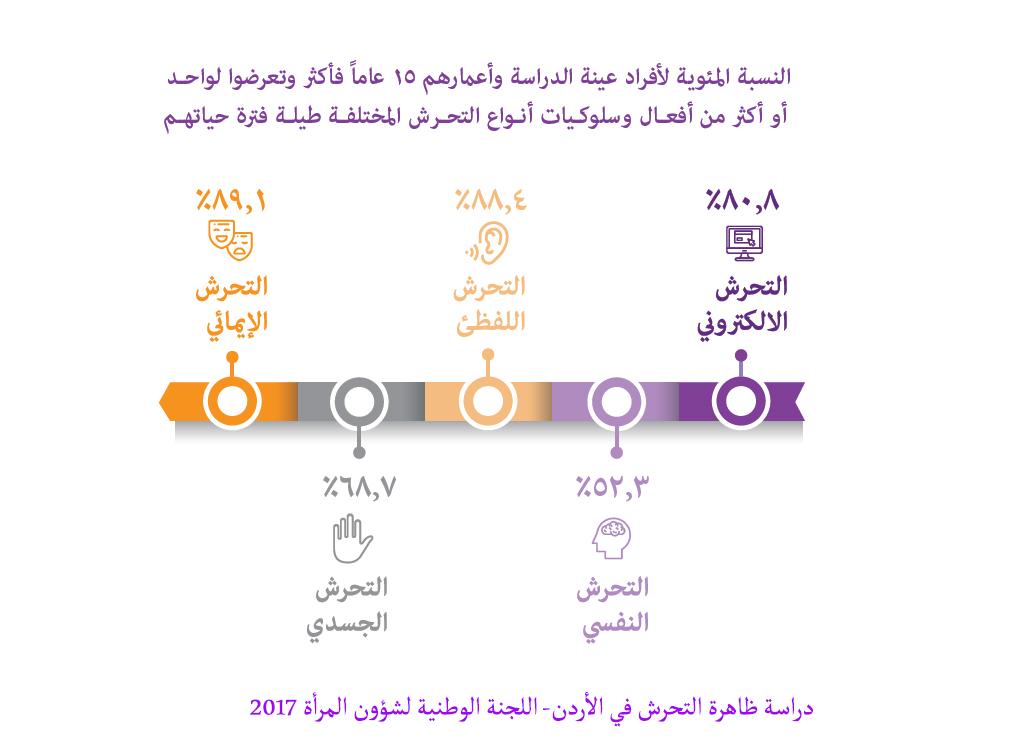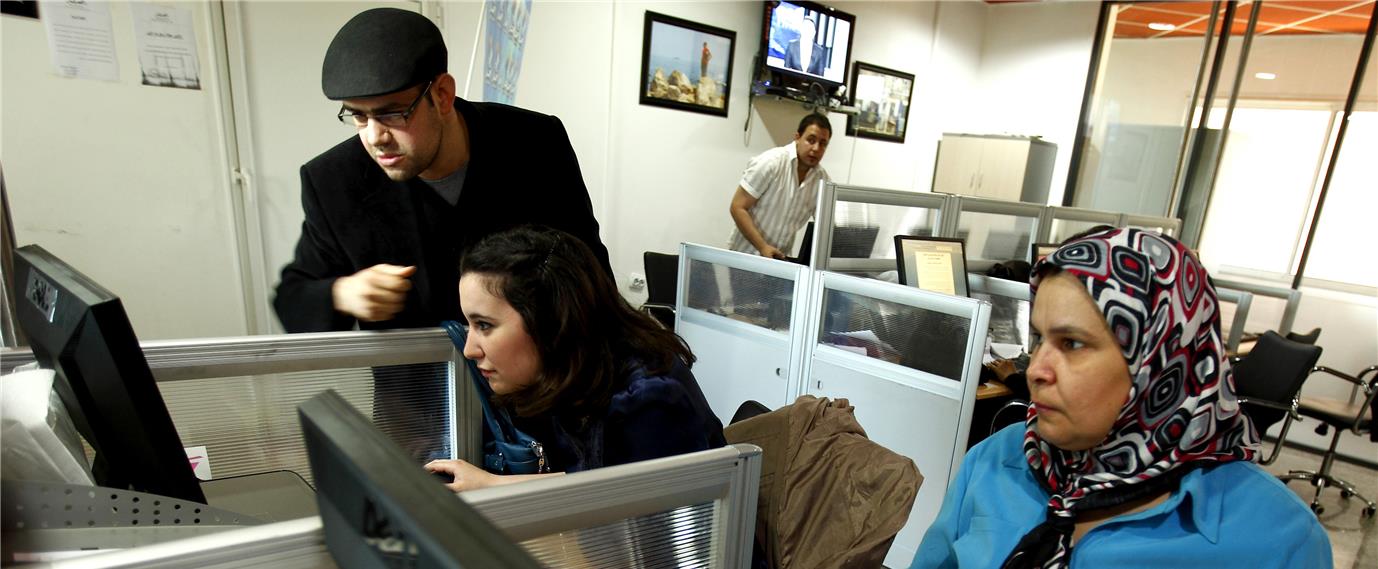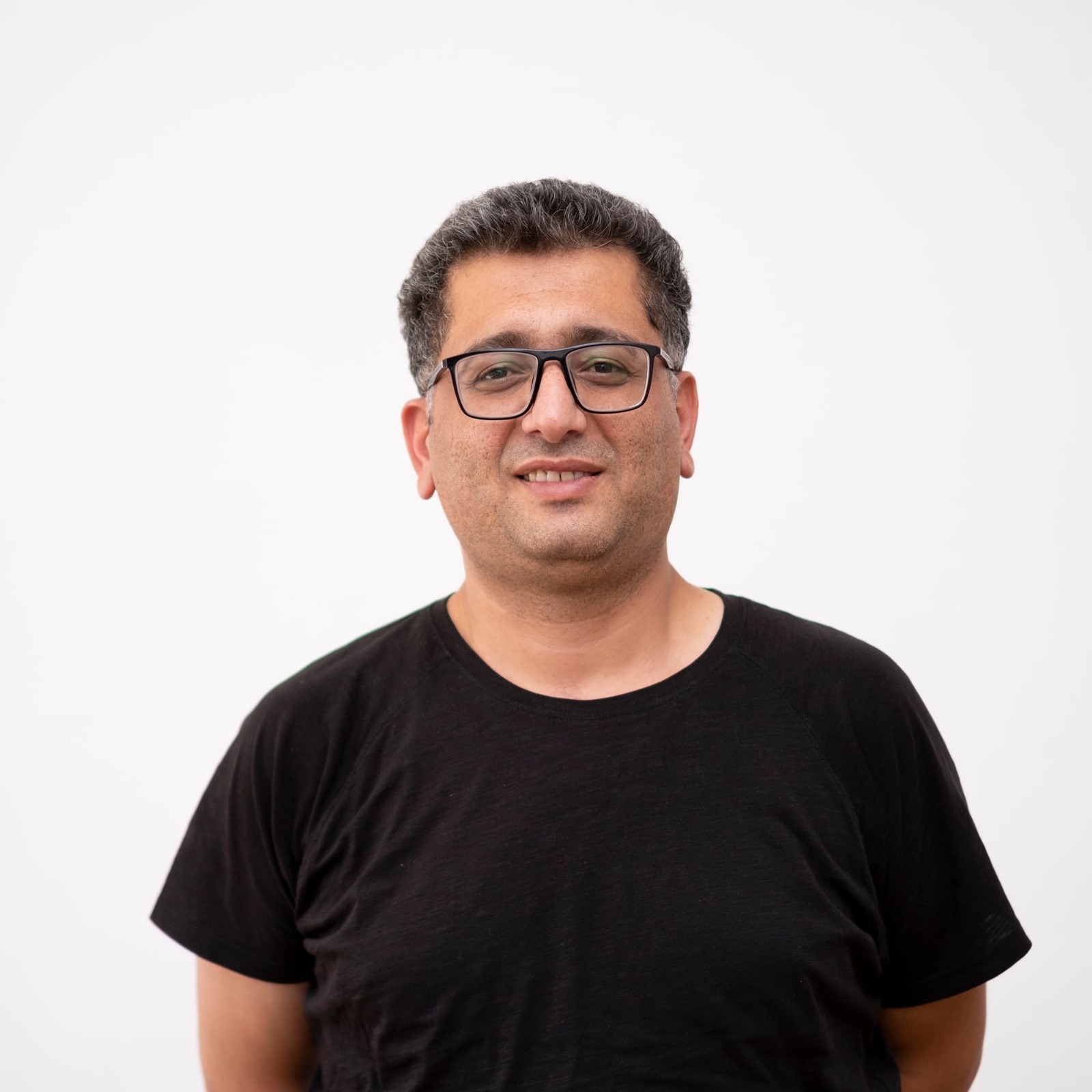توصلت دراسة نشرت في الأردن مؤخراً إلى أنَّ بيئة العمل في الصحافة "طاردة" للنساء الإعلاميّات بسبب عدم توفر بيئة عمل مناسبة لهنّ، وممارسة التمييز ضدهنّ من قبل أصحاب العمل ومصادر المعلومات، وتعرضهن للتحرّش.
لا تثق مصادر المعلومات وبعض المؤسسات الرسميّة الأردنيّة (الديوان الملكي، الوزارات، البرلمان) بالمرأة كإعلاميّة، وتفضّل الرجل عليها لبثّ الأخبار والمعلومات.
يبلغ عدد المؤسسات الإعلاميّة في الأردن 309 مؤسسات، تتوزّع بين محطات فضائيّة، وإذاعات، ومطبوعات إلكترونيّة وورقيّة، ومطبوعات متخصصة، يعمل فيها 1229 إعلامياً ممن هم أعضاء في نقابة الصحفيين، منهم 260 إعلاميّة تبلغ نسبتهن 21% من العدد الكليّ.
تُعدُّ نسبة مشاركة المرأة في سوق العمل الأردنيّ منخفضة بشكل عام، وينسحب الأمر على قطاع الإعلام. إلا أن اللافت كان غياب المرأة تقريبًا عن المراكز القيادية في المؤسسات الإعلاميّة، بحسب دراسة "تقييم واقع عمل الصحفيات في مؤسسات الإعلام الأردنيّة" التي أجرتها منظمة "دعم الإعلام الدولي" (IMS)، إذ يُلاحظ "عدم وجود وسيلة إعلام أردنيّة تملكها امرأة، عدا قلّة من المطبوعات الإلكترونيّة وقناة فضائيّة واحدة، وأيضاً خلو المواقع القيادية الأولى في الصحف اليوميّة من النساء، في حين برزت النساء في مواقع إدارية متوسطة وعُليا في بعض المحطات الإذاعية والتلفزيونيّة".
التمييز وعدم الثقة
يمكن ملاحظة غياب المرأة أيضا خلال اللقاء الذي ينظمه الديوان الملكي دوريًّا بين الإعلاميين والملك لبحث مواضيع تتعلّق بالمشهد السياسيّ الأردنيّ، إذ شهد الاجتماع الأخير حضور عشرة إعلاميين كان بينهم امرأة واحدة فقط، بينما لم تشهد لقاءات سابقة حضور أي إعلامية.

الأمر نفسه ينسحب على المؤسسات الإعلامية الخاصة والعامّة في البلاد. فوفقًا للدراسة، تغيب المرأة عن المراكز القياديّة في هذه المؤسسات، وإن حضرت يكون تمثيلها خجولا. فعلى سبيل المثال، لم يسبق أن كان هناك ناطقة إعلامية في وزارات الحكومة الأردنية.
في العام 2005، كانت الصحفيّة عطاف الروضان أوّل امرأة تبثّ على الهواء مباشرة من داخل مجلس النواب الأردنيّ لصالح إذاعة "البلد"، واستمرت لخمس سنوات. تتذكر الروضان طريقة التعامل معها في تلك الفترة من قِبل مصادر المعلومات: "كانت المصادر تفضل إعطاء الأخبار لصحفية امرأة، وكانوا يفضلون التعامل مع المرأة الصحفيّة". وتستدرك: "اكتشفت أنَّ المعلومات والأخبار التي تُعطي لي كصحفيّة ليست مهمّة أو لا تؤثر على سياق الأحداث، إذ كانوا يفضلون الصحفيين الرجال".
تشير الروضان إلى أن تفضيل بعض الصحفيين كان سببه أحياناً أنهم يتبعون صحفا قريبة من الحكومة، إضافة إلى أولئك التابعين لوكالة الأنباء الرسميّة "بترا"، مضيفة "لكنني كنت أرى في كثير من الحالات تفضيل الصحفيين الرجال على الصحفيات في تزويدهم بالأخبار. هناك الكثير من الأحداث التي تدلّ على أنَّ مصدر المعلومات لا يثق بالصحفية". كانت الدراسة قد توصلت إلى أنَّ 49% من الصحفيات أفدن بتعرضهن لتمييز على صعيد الحصول على المعلومات.
وعلى الرغم من وصول إعلاميّات أردنيات إلى مواقع قياديّة في مؤسسات إعلاميّة، مثل: دعاء علي ولينا عجيلات في رئاسة وإدارة تحرير موقع "حبر"، وجمانة غنيمات في رئاسة تحرير صحيفة "الغد"، وهالة زريقات مديرةً للتلفزيون الأردني، فإنَّ الطابع العام هو غياب الإعلاميات عن المواقع القيادية.
لكن، ما الذي سيتغيّر حين تُوجد المرأة في موقع قيادي داخل المؤسسة الإعلاميّة أو في القسم السياسيّ؟ إذ تبلغ نسبة الإعلاميات العاملات في تغطية الشأن السياسيّ (صفر%) من عيّنة الدراسة.
التفاصيل والمسحة الإنسانيّة
استحوذت تغطيات قانون العفو العام في الأردن مؤخراً على منصات وسائل الإعلام المحليّة. وبينما كُتبت عشرات التغطيات والمقالات عمَّن يجب أنيشملهم هذا العفو، وعمن يجب ألا يشملهم، وكلفة السجناء على الدولة، كانت صحفيّة أردنيّة تتناول قضيّة إحراق أردنيّ لطفلته الصغيرة وكيف سيشمله العفو العام. وقد بدا لافتاً للانتباه أسلوب الصحفية، وكيف تركت خلفها كل العناوين الكبيرة واهتمت بموضوع تفصيليّ سيأخذ منحى إنسانيًّا وبعيدًا عن التجريد.
كانت تلك أحد أنماط التغطيات الصحفيّة للشؤون السياسيّة التي تقوم بها المرأة في الإعلام، والتي رصدتها سوسن زايدة أثناء إعدادها للدراسة، لكنَّها لم تدرجها في دراستها لعدم وجود "رابط مباشر".
تقول زايدة -وهي صحفيّة وباحثة في شؤون الإعلام- "وضعنا هذه الفرضيّة (وجود نمط تغطيات صحفيّة إذا كان الموكل بالتغطية امرأة لا رجلا) مسبقًا قبل إعداد الدراسة، كإحدى النقاط مدار البحث، لكن لم يكن هناك علاقة مباشرة.. لم نجد".
تضيف "وجدنا أن الرجال أكثر ميلا إلى تغطية السياسة بمعناها المجرد (تناول السلطة والوزراء والبرلمان والنخب السياسيّة). أما ربط الموضوع السياسيّ بالمعنى الحياتي وحياة الناس اليوميّة فهي من لمسة المرأة الصحفيّة".
التحرّش
"دعوات لشرب القهوة في المكاتب، نظرات، وتصرفات صبيانيّة، وكلام غير مناسب"، مجمل ما تعرّضت له الصحفيّة الأردنيّة (س) أثناء تغطيتها أخبار إحدى المؤسسات الرسميّة، لكنها تضع مسألة مهمّة هنا في سياقها، إذ كانت كنيتها عاملاً أساسياً في الحدّ من هذه التحرشات، "اسمي حماني، لكن الأمر لم يكن نفسه مع زميلاتي".
تعرضت الصحفيّة (س) لتحرش لفظي خلال عملها خارج المكتب، "أغلب المؤسسات الإعلاميّة هنا ذات طابع عائلي، وتسود فيه روح عائلية، لذا يعتبر مكان التغطية هو الأكثر احتمالية للتحرّش".
وفقاً للدراسة، كانت النسبة الأكبر للتحرش بالإعلاميّات خارج مكان العمل وبواقع 47%، تليها مصادر المعلومات 43%، وفي مكان العمل بالنسبة ذاتها. ومن عيّنة الدراسة ككل، كانت 45% من الإعلاميّات تعرضن لتحرش جنسيّ. وهل أثرّ هذا التحرّش على عمل الصحفيات أو وظائفهنّ؟ تؤكّد زايدة "نعم، هناك من تركت تغطية موضوع أو تركت وظيفتها بسبب التحرّش".
تقترب نسب التحرّش التي أوردتها هذه الدراسة مع دراسات سابقة مثل دراسة صادرة عن اللجنة الوطنية لشؤون المرأة، إذ أظهرت أنَّ ما نسبته 51.5% من عينة الدراسة ممن تعرضن للتحرش بشكل عام كانت في مكان العمل/الدراسة، في حين كانت النسبة الأكبر للتحرشّ في الأماكن العامّة وبنسبة 77.3% من العيّنة.

معيقات أخرى
لا يقتصر الأمر على التحرّش، وتدني نسبة الإعلاميات في الشؤون السياسيّة، والمواقع القياديّة، وعدم وجود بيئة آمنة لهنّ، كمعيق لعمل الإعلاميّات الأردنيّات، فهن يواجهن أيضا معيقات أخرى مثل: عدم مُراعاة احتياجتهنّ من قبل المؤسسات الإعلاميّة التي تفرض ساعات دوام لا تتناسب وظروفهنّ الاجتماعيّة، وعدم توفير مرافق خاصّة أو حضانات لأطفالهنّ، والتمييز ضدّهن من قبل مصادر المعلومات كالسياسيين وموظفي الحكومة، الأمر الذي انعكس على المنافسة في الحصول على المعلومات.
تحاول الحكومات الأردنيّة -وإن بنسب متفاوتة- إعطاء المرأة حقّها في المناصب القياديّة، وشهدت الحكومة الأخيرة أكثر من أي حكومة في عمر المملكة؛ وجود وزيرات، وعيّنت رئيسة تحرير "الغد" الإعلامية جمانة غنيمات ناطقة باسم الحكومة، وفي 2003 كانت أسمى خضر وزيرة للإعلام. لكن الآمال أكبر من قبل الناشطات في مجال حقوق المرأة لوصول الإعلاميّة إلى مناصب عُليا، لكن ليس فقط في إجراءات الحكومة، وإنما كذلك في صياغة تشريعات بهذا الشأن "إدخال تعديلات على التشريعات (..)، تعديل أنظمة عضوية نقابة الصحفيين لإيجاد آليات تدعم الإعلاميّات (..)، تطوير أنظمة مؤسسيّة لحماية الإعلاميّات".
لا يبدو أنَّ المعيقات التي أوردتها الدراسة تختصّ بالأردن فقط، إذ تقترب نسب هذه الدراسة من دراسات أخرى في دول الجوار، حيث تبلغ نسبة الصحفيات الفلسطينيات العاملات في مؤسسات إعلامية فلسطينية (23%) من العدد الكليّ للعاملين في الصحافة. بالإضافة إلى معيقات أخرى أدّت إلى أن تكون بيئة العمل الصحفيّة "طاردة للنساء ومهددةلاستمرارهن في المهنة".
المراجع
1- وفقًا لأرقام هيئة الإعلام، يُوجد في الأردن 38 محطة فضائيّة، و39 إذاعة، و30 مطبوعة ورقيّة، و170 مطبوعة إلكترونيّة، و32 مطبوعة متخصصة.
2- لا تعبّر هذه الأرقام بشكل دقيقٍ عن أعداد العاملات في الإعلام، إذ الكثير من الإعلاميين الأردنيين خارج نقابة الصحفيين.
3- نسبة مشاركة المرأة في الاقتصاد الأردنيّ لعام 2016 تبلغ 13.4%.
4- باستثناء صحيفة "الغد" التي رأست تحريرها جمانة غنيمات قبل أن تدخل التشكيلة الحكومية كوزيرة عام 2018.
5- الصحف اليوميّة الرسمية أو شبه الرسمية (الدستور والرأي) لكل صحيفة مجلس إدارة من تسعة أشخاص، لا يوجد بينهم امرأة، بينما لا توجد في صحيفة "السبيل" القريبة من جماعة الإخوان المسلمين امرأة في مجلس إدارتها.
6- استثنت الدراسة كاتبات المقال السياسيّ اللائي يمارسن نشاطا اقتصاديا ويكتبن المقال.
7- رسالة ماجستير بعنوان "العوامل المؤثرة على الرضا الوظيفي لدى الصحفيات الفلسطينيات في فلسطين.. دراسة ميدانية"، الجامعة الإسلامية، سامية عدنان العجوري، ص 82.








































